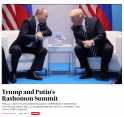Brilliant “life imitates art” DoubleQuote
[ by Charles Cameron — a superb find & capture ]
.
Life imitates art.#G20Summit by #craignewmark pic.twitter.com/C6fynHqfZO
— Russ Turner (@MadHelp4U) July 7, 2017
In an earlier tweet, Turner identified “Underwood and Petrov in ‘House of Cards’ season 3 vs. Trump and Putin IRL by #timoreilly“. That’s them.
I got this via Thomas Hegghammer, who has a keen European eye — something I suspect may be invaluable in analytic work.
**
Likewise noteworthy, a neat title to an Atlantic piece on the same meeting of the minds — which also exhibits double vision:

Here’s the relevant detail-work from the text of that piece:
Attendance at the meeting was sharply limited, reportedly in order to avoid leaks: There were just six people in the room, including each president’s foreign-policy chief and an interpreter for each side. That means that anyone curious to know what was discussed is forced to rely on the accounts of the two governments involved—neither of which has a sterling reputation for honesty.
Adding to the confusion, the two initial accounts of the meeting differ sharply. Russian and American officials, together with Jordan, announced a cease-fire in southwest Syria, the one major material accomplishment, though one that based on Jordan’s involvement was clearly in the works long before the two presidents met. The two sides also agreed to set up a working group on cybersecurity. From there, accounts diverge, creating a Rashomon-like situation in which it’s likely impossible to piece together what actually happened.
Rex Tillerson, the U.S. secretary of state, briefed reporters in Hamburg on the discussion. Tillerson said Trump had begun the meeting by pressing Putin about Russian interference in the 2016 presidential election.
“The president opened the meeting by raising the concerns of the American people regarding Russian interference in 2016 election. Putin denied such involvement, as he has done in the past,” Tillerson said. He said that Trump had returned to the topic more than once during the meeting. (As the meeting ran over, first lady Melania Trump was reportedly sent inside in an unsuccessful attempt to get the men to wrap up.)
Russian Foreign Minister Sergei Lavrov, also briefing reporters in Hamburg, agreed that Trump had brought up the accusations, but that Trump had accepted Putin’s version of the events, which is that Russia is innocent of any involvement. U.S. officials denied that. He also claimed Trump had dismissed the allegations: “Trump mentioned that in U.S. certain circles still inflate subject of Russian meddling in elections, even though they have no proof.”
It’s hard to know what to believe. Lavrov and Russia have obvious motivation to lie about what happened. But Trump has repeatedly shown that despite his bluster about being a tough negotiator, he can be easily persuaded by foreign leaders during face-to-face meetings, abandoning long-held positions when effectively debated by a counterpart. (This is one reason that Putin, like other foreign leaders, was so eager to meet in person.)
Moreover, Trump’s own view on the interference in the election remains opaque. He has never fully accepted the judgment of U.S. intelligence agencies and most of his own aides that Russia was behind hacking of email accounts and other feints. Most recently, on Thursday in Warsaw, Trump suggested that Russia might have been involved but might not have been alone, and concluded, “Nobody really knows. Nobody really knows for sure.”
Rashomon indeed! — but maybe that’s the play here: obfuscate.